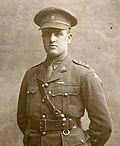From today's featured articleBill McCann (1892–1957) was a decorated soldier of World War I, a barrister, and a prominent figure in the military and ex-service community of South Australia during the interwar period. He enlisted in the Australian Imperial Force as a private in 1914, and rose through the ranks to be commissioned during the Gallipoli Campaign of 1915. In 1916–1918 he fought on the Western Front in France and Belgium, was wounded twice, and rose to the rank of major. For his gallantry on 10 August 1918 at Crépey Wood, he was made a Companion of the Distinguished Service Order. Returning home, McCann became a barrister, and was active in returned servicemen's organisations. He was state prices commissioner and deputy Commonwealth prices commissioner from 1938 to 1954. In recognition of his work with the ex-service community, McCann was appointed an Officer of the Order of the British Empire in 1935, and a Companion of the Order of St Michael and St George in 1956. (Full article...)
Recently featured:
Did you know...
|
In the news Student protests in Dhaka, Bangladesh
On this day
Madeleine of Valois (b. 1520) · Suzanne Collins (b. 1962) · Jennifer Paterson (d. 1999) |
From today's featured list

Only a small fraction of the 3,800 known exoplanets are located in the vicinity of the Solar System. Of the 400 stars known to be located within 10 parsecs (32.6 light-years), just 26 have been confirmed to have planetary systems. Only eight of these planetary systems are located around stars visible with the naked eye. One of the earliest confirmations for an exoplanet, or planet orbiting a star other than our Sun, was in 1998 for a planet orbiting around Gliese 876 just 15 light-years away. Since then, several closer exoplanets have been discovered, including an exoplanet found in 2016 to orbit Proxima Centauri, the closest star to our Solar System just 4.25 light-years away. A system containing six exoplanets has been observed around HD 219134, 22 light-years away. Some of the closest exoplanets have been proposed to have potential for human habitability. (Full list...)
Today's featured picture

|
A three pence note of "Marshall Hole currency", issued in Bulawayo in 1900. Owing to the shortage of small change and circulating coinage in Rhodesia during the Second Boer War, Hugh Marshall Hole, Government Secretary for Matabeleland, authorised the use of small cards bearing a British South Africa Company postage stamp on the obverse, and an official handstamped signature on the reverse. These cards circulated as emergency currency between 1 August 1900 and their withdrawal on 1 October 1900. A total of £20,000 worth of stamps were used, in denominations of 2d, 3d, 4d, 6d, 1/-, 2/-, 2/6, 4/-, 5/- and 10/-. Banknote: Office of Hugh Marshall Hole (image courtesy of the National Numismatic Collection, National Museum of American History)
Recently featured:
|
Other areas of Wikipedia
- Community portal – Bulletin board, projects, resources and activities covering a wide range of Wikipedia areas.
- Help desk – Ask questions about using Wikipedia.
- Local embassy – For Wikipedia-related communication in languages other than English.
- Reference desk – Serving as virtual librarians, Wikipedia volunteers tackle your questions on a wide range of subjects.
- Site news – Announcements, updates, articles and press releases on Wikipedia and the Wikimedia Foundation.
- Village pump – For discussions about Wikipedia itself, including areas for technical issues and policies.
Wikipedia's sister projects
Wikipedia is hosted by the Wikimedia Foundation, a non-profit organization that also hosts a range of other projects:
| |
Commons Free media repository |
|
MediaWiki Wiki software development |
|
Meta-Wiki Wikimedia project coordination |
| |
Wikibooks Free textbooks and manuals |
|
Wikidata Free knowledge base |
|
Wikinews Free-content news |
| |
Wikiquote Collection of quotations |
|
Wikisource Free-content library |
|
Wikispecies Directory of species |
| |
Wikiversity Free learning materials and activities |
|
Wikivoyage Free travel guide |
|
Wiktionary Dictionary and thesaurus |


